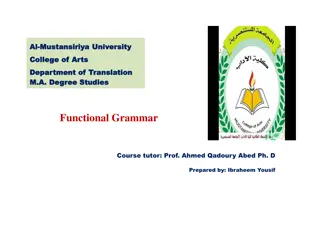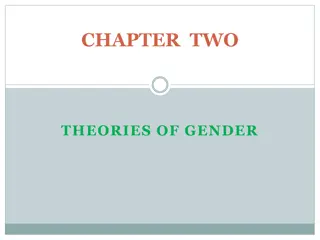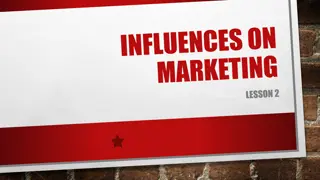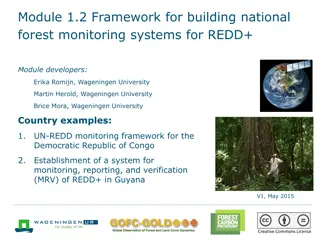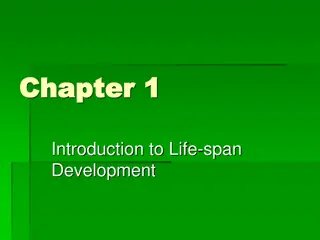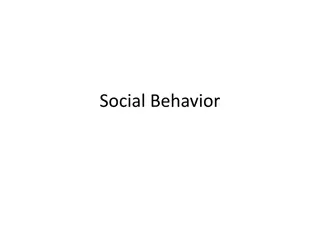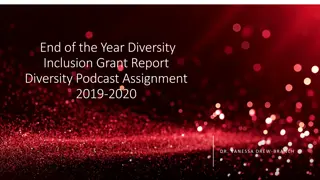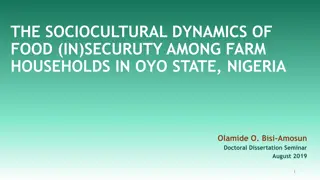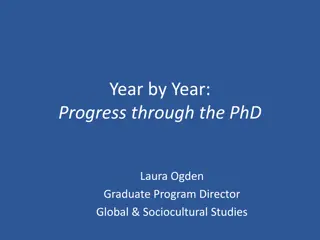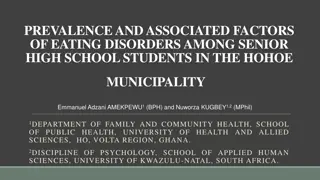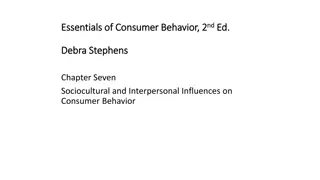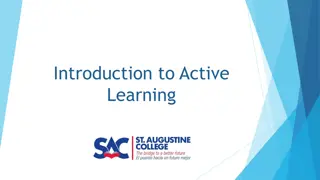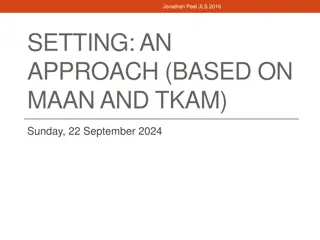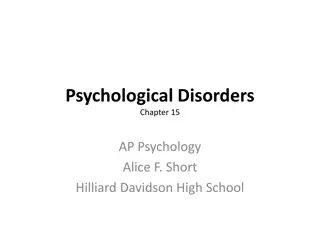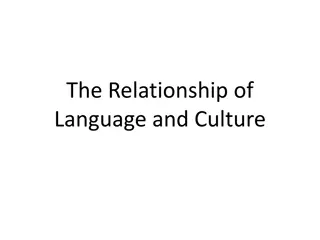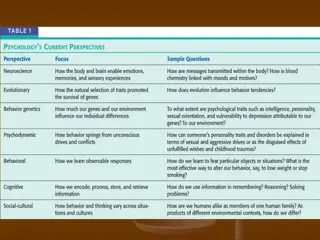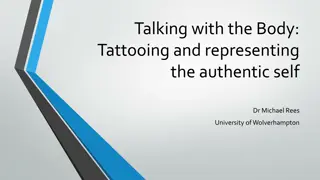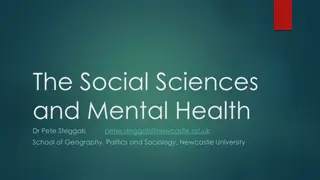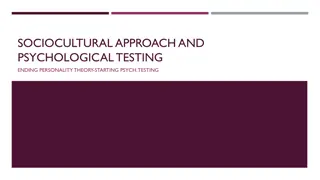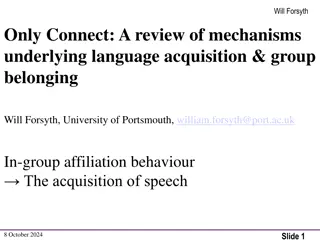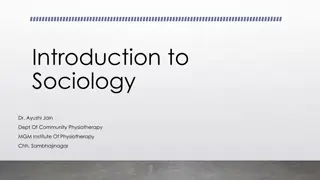Enhancing Scientific Literacy in Early Years Play-Based Learning
This PhD research proposal explores scientific literacy among children in play-based learning, focusing on everyday concepts and their application to scientific understanding. The study aims to implement Vygotsky's sociocultural theory to enhance children's scientific literacy through Vision 1 and V
7 views • 19 slides
MARKETING ENVIRONMENT
The marketing environment comprises external factors impacting an organization's relationship with customers. It includes macro-environment (legal, technological, sociocultural), micro-environment (demographic, economic, natural, technological, political, cultural forces), and internal environment.
2 views • 48 slides
Evolution of Mathematical Theories and Proof Systems
Development of mathematical theories such as model theory, proof theory, set theory, recursion theory, and computational complexity is discussed, starting from historical perspectives with Dedekind and Peano to Godel's theorems, recursion theory's golden age in the 1930s, and advancements in proof t
1 views • 29 slides
Understanding Systemic Functional Linguistics in Contemporary Language Studies
Explore the role of language in everyday life, the principles of Systemic Functional Linguistics, and the application of discourse analysis in translation. Delve into the Hallidayan model of language and discourse, examining genre, register, sociocultural environment, and more.
0 views • 20 slides
Understanding Theories of Gender and Behavior
Explore traditional gender characteristics, past biological and sociocultural factors, current biological and societal influences, and individual traits that shape gender-related behavior. Discover how group-level factors and societal-environmental influences play a role in defining gender roles and
4 views • 40 slides
Psychological Theories of Criminality: Understanding the Roots
Psychological theories of criminality delve into the association between intelligence, personality, learning, and criminal behavior. Major theories include Psychodynamic Theory by Freud, Behavioral Theory by Bandura, and Cognitive Theory by Kohlberg. These theories explore how unconscious mental pro
1 views • 20 slides
Understanding the Theory of Firms: Neoclassical vs. Modern Approaches
The theory of firms is explored through the Neoclassical and Modern perspectives. Neoclassical theory focuses on profit maximization, while Modern theory delves into managerial, principal-agent, and transaction cost theories. The discussion covers criticisms of Neoclassical theory and the essential
1 views • 79 slides
Theories of Causation in Psychological and Social Sciences
Overview of theories of causation categorized into psychological, social psychological, and sociological perspectives. Psychological theories focus on instinctive, biological, and psychological qualities of abusers, including Attachment Theory, Psychodynamic Theory, Social Learning Theory, and Situa
0 views • 15 slides
Understanding Political Theory through a Contextual Approach
Exploring G.H. Sabine's perspective on political theory through a contextual approach, emphasizing the importance of historical context and societal influences. Sabine argues that while political theory evolves with its contemporary politics, it should be analyzed within its specific time and social
0 views • 9 slides
Factors Influencing Customer Choice: Psychological, Sociocultural, Economic, and Government Factors
Psychological factors, such as perception and lifestyle, play a key role in customer choice. Sociocultural influences from society and culture also impact decisions, while economic factors like income levels and government policies can sway customer preferences. Understanding these factors is crucia
0 views • 18 slides
Evolution of Light Theory: From Wave Theory to Quantum Theory
At the turn of the century, the discovery of the photoelectric effect challenged the wave theory of light, leading to the development of the quantum theory by Max Planck and Albert Einstein. This new theory introduced the concept of discrete energy units known as quanta, bridging the gap between wav
1 views • 62 slides
Framework for Building National Forest Monitoring Systems for REDD+
This module outlines a comprehensive framework for developing national forest monitoring systems for REDD+ initiatives. It covers key components such as satellite land monitoring, national forest inventories, greenhouse gas reporting, emission factors, and integrated monitoring systems focusing on c
0 views • 14 slides
Dp-branes, NS5-branes, U-duality, and M-Theory Overview
Overview of Dp-branes, NS5-branes, and U-duality derived from nonabelian (2,0) theory with Lie 3-algebra. Introduction to M-theory, including M2-branes and M5-branes in the strong coupling limit. Discussion on BLG theory, Lorentzian Lie 3-algebra, and the ABJM theory for M2-branes.
1 views • 32 slides
Overview of Life-span Development and Contemporary Concerns
This content introduces the concept of life-span development, highlighting the life-span perspective, human life span versus life expectancy, and characteristics of this developmental approach. It touches on contemporary concerns such as health, well-being, parenting, education, sociocultural contex
5 views • 50 slides
Understanding Sociocultural Context in Social Behavior
Human behavior is inherently cultural due to our social nature, shaping our interactions through shared meanings and institutions. Social behaviors vary across cultures, influenced by cultural transmission. Indigenous social psychologies cater to specific societies, emphasizing the importance of rol
3 views • 58 slides
Developing Communicative Competence in English Language Teaching
In English language teaching, the main goal of a communicative classroom is to foster students' communicative competence. This includes grammatical competency, sociocultural competency, discourse competency, and strategic competency. By focusing on these aspects, educators aim to enhance students' a
0 views • 7 slides
Diversity & Inclusion Grant Report: Podcast Assignment Review 2019-2020
This report discusses the Diversity & Inclusion Grant report for the Diversity Podcast Assignment completed by HSS students under Dr. Vanessa Drew-Branch. The assignment included pre/post-tests, podcast groups connected to service-learning sites, and focused on sociocultural knowledge and systemic f
0 views • 10 slides
Understanding Time-Independent Perturbation Theory in Quantum Mechanics
Perturbation theory is a powerful tool in solving complex physical and mathematical problems approximately by adjusting solutions from a related problem with known solutions. This theory allows for more accurate approximate solutions by treating the difference as a small perturbation. An example inv
0 views • 19 slides
Ethical Theories: Divine Command vs. Virtue Theory Explained
Divine Command Theory asserts that morality is derived from God's commands, contrasting with Virtue Theory which focuses on developing moral virtues to achieve human flourishing and excellence. Divine Command Theory relies on religious texts, while Virtue Theory emphasizes the cultivation of virtues
0 views • 24 slides
Sociocultural Dynamics of Food (In)security Among Farm Households in Oyo State, Nigeria
This doctoral dissertation seminar explores the sociocultural dynamics of food security among farm households in Oyo State, Nigeria. It delves into demographic characteristics, food production and consumption patterns, socio-cultural drivers of behaviors, and factors influencing food security. The s
0 views • 33 slides
Progress through the PhD Program: Year-by-Year Guide
Navigate your PhD journey with this comprehensive year-by-year progress guide designed by Laura Ogden, Graduate Program Director of Global & Sociocultural Studies. From choosing classes to conducting research and dissertation work, stay on track by following the outlined goals for each year. Ensure
0 views • 11 slides
Prevalence and Factors of Eating Disorders Among High School Students
Eating disorders pose serious risks to individuals, influenced by various factors such as genetics, trauma, and sociocultural ideals. The disorders, including anorexia nervosa and bulimia nervosa, have high mortality rates and often coexist with other mental conditions. Recognizing signs like body i
1 views • 28 slides
Understanding Fermi Liquid Theory in Interacting Fermion Systems
Fermi liquid theory, also known as Landau-Fermi liquid theory, is a theoretical model that describes the normal state of metals at low temperatures. Introduced by Landau and further developed by Abrikosov and Khalatnikov, this theory explains the similarities and differences between interacting ferm
0 views • 23 slides
Sociocultural and Interpersonal Influences on Consumer Behavior
Explore how cultures, social identities, friends, family, and reference groups affect consumer behavior. Learn about the impact of interpersonal relationships on product sharing and brand experiences. Understand the significance of cultural influences, reference groups, and how they shape consumer d
0 views • 6 slides
Understanding Active Learning in Education
Active learning engages students in the learning process through meaningful activities and requires them to think about what they are doing. It is not a one-size-fits-all approach and can vary based on various factors. Theoretical underpinnings, such as Constructivist Learning Theory and Sociocultur
0 views • 9 slides
Introduction to Psychology: Understanding Behavior and Mental Processes
This material covers key aspects of psychology including the definition of psychology, its scientific nature, comparison with fake sciences, the birth of modern psychology, and different perspectives in psychology such as learning, biological, cognitive, and sociocultural. It delves into the roots o
0 views • 42 slides
Computational Learning Theory: An Overview
Computational Learning Theory explores inductive learning algorithms that generate hypotheses from training sets, emphasizing the uncertainty of generalization. The theory introduces probabilities to measure correctness and certainty, addressing challenges in learning hidden concepts. Through exampl
0 views • 43 slides
Automata Theory and Theory of Computation Overview
This course overview covers concepts in automata theory and theory of computation, including formal language classes, grammars, recognizers, theorems in automata theory, decidability, and intractability of computational problems. The Chomsky hierarchy, interplay between computing components, modern-
0 views • 42 slides
Exploring Setting in Literature: An In-Depth Analysis of Character and Theme Relationships
Delve into the significance of setting in literary works like "To Kill a Mockingbird" and "Much Ado About Nothing", uncovering its impact on character development and thematic elements. Discover how precise locations, historical eras, and sociocultural contexts create a rich tapestry that shapes the
0 views • 12 slides
Understanding Psychological Disorders: Theoretical Approaches and Abnormal Behavior
Explore the realm of psychological disorders through theoretical approaches such as the Biological, Psychological, and Sociocultural models. Delve into the complexities of abnormal behavior, including definitions and examples. Gain insights into the impact of biological, psychological, and sociocult
0 views • 47 slides
The Intricate Relationship Between Language and Culture
Language serves as a vital tool for social interaction, intricately woven into the fabric of culture. It expresses, embodies, and symbolizes cultural realities. In the interplay of nature and culture, language immortalizes and transforms elements like roses, embodying essential aspects of society. T
0 views • 9 slides
Theories of Interest in Microeconomics II
Explore various theories of interest in economics, including the Classical Theory, Liquidity Preference Theory by Keynes, Productivity Theory, Abstinence Theory, Time-Preference Theory, Fisher's Time Preference Theory, and the Loanable Fund Theory. These theories offer different perspectives on the
0 views • 6 slides
Exploring the Evolution of Atomic Theory
Delve into the historical journey of atomic theory starting from Democritus and Aristotle's views to modern advancements proving some aspects of Dalton's theory incorrect. Learn about key laws and theories such as the Particle Theory of Matter, Dalton's Atomic Theory, and JJ Thomson's discoveries, s
0 views • 30 slides
Understanding the 7 Approaches in Psychology: Applied in the Case of Andrea Yates
Explore how the 7 psychological approaches - psychological, cognitive, behavioral, humanistic, biological, sociocultural, and evolutionary - can help analyze the complex case of Andrea Yates, who tragically murdered her children, delving into factors like postpartum depression, brain chemistry, fami
0 views • 12 slides
Exploring Authenticity through Tattooing: A Sociocultural Perspective
Delve into the intricate relationship between authenticity and tattooing as a means of self-representation. This discourse examines how individuals navigate their sense of self amid societal expectations, with tattoos serving as visible expressions of personal identity and authenticity. Through insi
0 views • 21 slides
Exploring the Intersection of Social Sciences and Mental Health
Delve into the dynamic relationship between social sciences and mental health, examining the sociocultural influences on mental illness through various theoretical perspectives. Explore methodologies in sociology and anthropology that analyze interpersonal relationships, power dynamics, and cultural
0 views • 35 slides
Sociocultural Factors Influencing Self-Concept and Identity Formation
Explore the impact of sociocultural factors on self-esteem, economic background, gender, and race in shaping one's sense of self. Delve into the concepts of Individualism and Collectivism, analyzing how different parts of the world prioritize these values. Reflect on the importance of teaching child
0 views • 38 slides
Mechanisms Underlying Language Acquisition and Group Belonging
Will Forsyth's review explores how in-group affiliation behaviors facilitate speech acquisition through sociocultural, social-psychological, and social cognition approaches. Neural adaptations in Homo sapiens since Australopithecus, particularly in speech-related areas, are crucial for language evol
0 views • 8 slides
Macromechanical Analysis of Lamina and Tsai-Hill Failure Theory Overview
The Tsai-Hill failure theory is based on the strengths of a unidirectional lamina, incorporating longitudinal and transverse tensile and compressive strengths, as well as in-plane shear strength. This theory, derived from the distortion energy theory, provides criteria for determining lamina failure
0 views • 15 slides
Sociology in Physiotherapy: Understanding Sociocultural Influences
Sociology plays a crucial role in physiotherapy as it helps professionals understand the societal and cultural factors that influence individuals. Through the study of social relationships and behaviors, physiotherapists can better address their clients' needs and provide tailored care. The applicat
0 views • 12 slides



